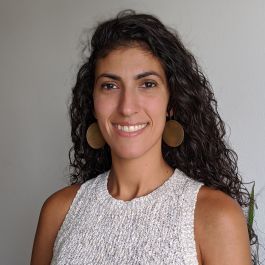How much of a difference can one person make? How about one company?
Nadia Abouzaid wanted to make a change on a large scale. And that’s just what she had in mind when she accepted an offer as the diversity talent programs manager at Asana, a work management software company.
“Building representation and an inclusive, equitable culture gets harder the later companies try to do it,” Abouzaid said. “At a 20,000-person organization, to move one percentage point in terms of representation is so incredibly difficult. Driving organizational change is a really different ask at a large enterprise company than it is at a startup.”
Abouzaid said she saw a real opportunity to expand the diversity initiatives in Asana’s hiring practices, which already include the company’s “Rooney Rule,” D&I-specific recruitment methods and tools, unconscious bias training, and its internal Real Talk events series, among other initiatives. Her hope, along with other members of the company, is to help build an even more inclusive environment.
“It’s not enough to say that we want to diversify our engineering team or make it more representative, for example,” Abouzaid said. “We want to expand what the overall pool of engineers looks like.”
As the United States reckons with its history of racial injustice, many companies have taken a closer look at their hiring and management practices, investigating how to make their businesses more inclusive. It’s work that can be uncomfortable and frustrating at times — but to Abouzaid and the Asana team, it’s also deeply rewarding.
In a conversation with Built In NYC, Abouzaid shared Asana’s vision for building more diversity and inclusion at Asana, and how her team is helping to tackle these goals.

On the surface, everyone understands what bias looks like. But what are some common examples of what bias looks like in hiring?
Let’s say you look at someone’s resume and they went to an Ivy League school. You may unconsciously go into that interview thinking that that person is baseline qualified. You’ve already made an assumption that that person likely has the requisite skills that you’re looking for and, because they have a strong educational background, they must be a really smart person, right?
Now let’s say you meet with someone who went to community college or maybe doesn’t even have a degree. What you could end up doing is looking for them to prove that they have the competencies and the ability to do the job. Your starting baseline might be that this person does not have the qualifications.
Everyone, including people who do this work, comes to the table with bias and preconceived notions based on their experience. And so it becomes our job to actively check that bias.
With that in mind, how has the shift to remote work impacted the interview process? What have you had to do to make it fairer for all applicants?
We’ve aimed at being mindful of the impact that going remote can have on different populations. For example, being really conscious about shifting from phone interviews to video interviews, and what sorts of accommodations people might need. We’re being conscious of what that means in terms of communicating and the way we’re interpreting people’s communication, as we’re missing all of the critical body language signals that you typically get in-person.
Internally, we have also put a lot of support behind our community of parents and caregivers and are proactively thinking about and addressing the challenges in this stay-at-home environment for people who are caregivers.

Employee Resource Groups at Asana
- Gradient: Cultivates community for people of color and allies at Asana through conversations, community engagement and creating space for everyone’s experiences.
- Team Rainbow: Provides a space for queer people and allies to support and learn from each other in a safe and loving environment.
- AsanaWomen: Showcases the work and passions of women in the tech industry by providing a platform to celebrate their talents and spotlight role models.
How do you jumpstart the feeling of belonging before applicants are even hired?
What I find critically important is the idea of developing empathy and relationships with people. One way we do this is through events and partnerships. The reason we go to events and have a lot of partnerships is to get in touch with, identify and interact with people. The goal of those interactions is always to build empathy and connection, and give people the opportunity to cultivate relationships with folks who are already at Asana.
We’ve continued to maintain that dynamic by participating in virtual events and leaning into making some parts of our process more accessible. As an example, previously we may have been on specific college campuses and running workshops in-person for particular groups. But now, this dynamic has forced us to be thoughtful about making those same opportunities virtual, and thus making them accessible to a much broader audience.
It’s not just about change at Asana, it’s about larger, societal change. How do you tackle that?
AsanaUP, our engineering apprenticeship program, started a few years ago. It focuses on providing people with non-traditional backgrounds the opportunity to develop an inroad into software engineering. It’s not enough to say that we want to diversify our engineering team or make it more representative. We want to help expand what the overall pool of engineers looks like. It’s not just how to make engineering at Asana more accessible, but how do we make engineering as a profession more accessible?
With the AsanaUP apprenticeship program, we’re looking to scale that pool for our early-career hiring. We’re also looking to set those individuals up for success — not just once they’re in the door at Asana, where they have very hands-on mentorship for six months — but a step beyond that. How do we set them up to actually be a super-qualified applicant for this and other opportunities that they may be interested in?
REAL TALK

What do you want tech leaders to know about increasing D&I?
It can be relatively straightforward to get buy-in from people at the philosophical level around D&I work. But it can pose challenges within your business and the work can feel uncomfortable because you will be asked to change your way of thinking or change a way of working in a way you weren’t expecting.
Those are the times when companies often hit speed bumps. It’s important for leaders to acknowledge when they have a problem, but to also acknowledge that as well-intentioned as they all are, sometimes they are the challenge. We all have to be prepared to lean into the discomfort.













